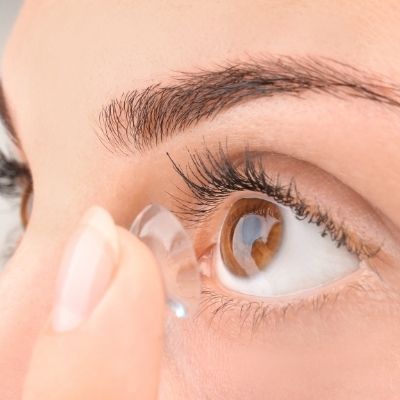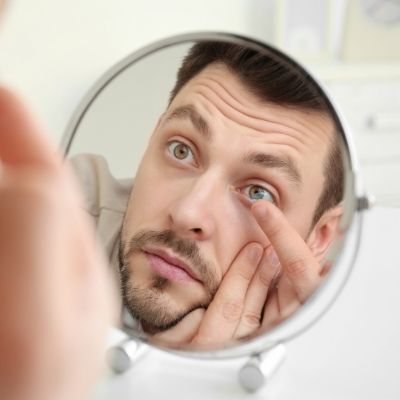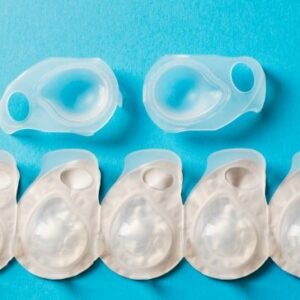If you’re interested in swapping out your monthlies for daily contacts, then you probably have a lot of questions. To help you choose, we’ve compiled a list of the most common questions we get asked about disposable contact lenses. These lenses have a host of benefits beyond helping you see better, and we believe you’ll notice the difference immediately.
The common questions that we’ll answer are:
- What’s the difference between daily and monthly contacts?
- Can daily disposables help with seasonal allergies?
- Are daily disposable contact lenses reusable?
- Can you switch from glasses to daily contacts in one day?
- Can you be allergic to your daily contact lenses?
What’s the Difference Between Daily and Monthly Contacts?
The primary difference between daily and monthly contact lenses is durability. Both are designed to be thrown away eventually, but monthly contacts are much thicker than dailies and last a lot longer. It’s also important to note that monthly, or extended wear contacts, still need to be taken out before bed to be cleaned and stored.
The main draw for extended wear contacts is that they last longer. However, they also have their downsides. For instance, residue still builds up on monthly lenses despite daily cleaning. This increases your risk of infection and seasonal allergies that can make your eyes feel dry, runny, sensitive, and irritated. Daily contacts prevent this by using a fresh pair every day.
Can Daily Disposables Help With Seasonal Allergies?
Countless people suffer from seasonal allergies, and contact-wearers are not immune. Common symptoms include:
- Swollen eyelids
- Red, irritated eyes
- Itchiness
- Runny or teary eyes
- Light sensitivity
One of the best defenses against these symptoms are daily disposables. Extended wear contacts still continue to collect pollen and other allergens even with cleaning. People who wear daily contact lenses don’t have this problem since the contacts are only worn once.
There are other steps you can take to reduce your seasonal allergy symptoms while wearing contact lenses. These include:
- Using quality eye drops to avoid dry eye when not wearing contacts
- Applying cold compresses to relieve irritation, itchiness, and swelling
- Wearing glasses during allergy season
By combining these steps with daily contact lenses, you are much more likely to enjoy the springtime!
Are Daily Disposable Contact Lenses Reusable?
Asking if you can reuse daily disposable contact lenses is similar to asking if you can eat bacon for every meal. You could, but no healthcare professional would ever recommend it. This is because both will eventually lead to long-term health problems. Bacon increases your risk of high cholesterol and other factors. Reusing daily lenses increases your risk of eye infection.
Wearing daily contact lenses multiple times actually defeats their biggest benefit: infection prevention. These types of lenses are designed to be thinner, making them more comfortable for most wearers. This also causes them to break down more quickly. As they break down, the threat of infection grows as well as blood vessel growth into your corneas (neovascularization).
Can You Switch From Daily Contacts to Glasses In One Day?
You can switch between daily contact lenses and glasses in one day. In fact, there are situations where this would be recommended. This includes taking your contacts out to go swimming or to take a nap. Taking them out prevents bacteria from the water getting in your eyes, and sleeping in them can cause irritation.
However, there are some important rules to keep in mind when switching between dailies and glasses in a day. The main one is that you shouldn’t reuse the same daily contact lenses. This is because they are much more fragile than longer-lasting lenses and can actually cause problems. Instead, simply wear your glasses the rest of the day or open a fresh pair of lenses.
Can You Be Allergic to Your Daily Contact Lenses?
It comes as a surprise to many people that you can be allergic to contact lenses. Fortunately, this is a very rare condition that only affects a few people. However, being allergic to your contact lens solution is much more common. This is often due to the preservatives used in certain solutions which coat your extended wear lenses or are absorbed by them.
This isn’t the case with disposable lenses. These daily-use contacts are designed to be thrown away every night and replaced with a new pair in the morning. This ensures that every pair is as fresh as possible and never has the chance to absorb or be coated in irritating solutions. They remove the worry you may have about an allergic reaction and go about your day stress-free.
The main difference between monthly and daily contacts is the durability of the lenses. Monthly lenses are cheaper but more prone to collecting allergens and causing infections. Daily contacts should only be worn once to get the most benefits. You can switch from daily contacts to glasses in one day with ease. It’s rare to be allergic to contacts, but more common to be allergic to contact lens cleaning solutions and products. Daily contacts prevent this from happening since they’re only worn once.
Hardin Valley Eyecare & Optical has been serving Knoxville since 2009. Located at 10904 Spring Bluff Way, you can schedule an appointment online or call us at (865) 888-0892.





